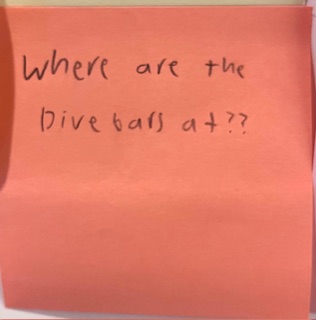
Model Cafe isn’t too far from campus. But generally, the South End and Southie have a lot of options.
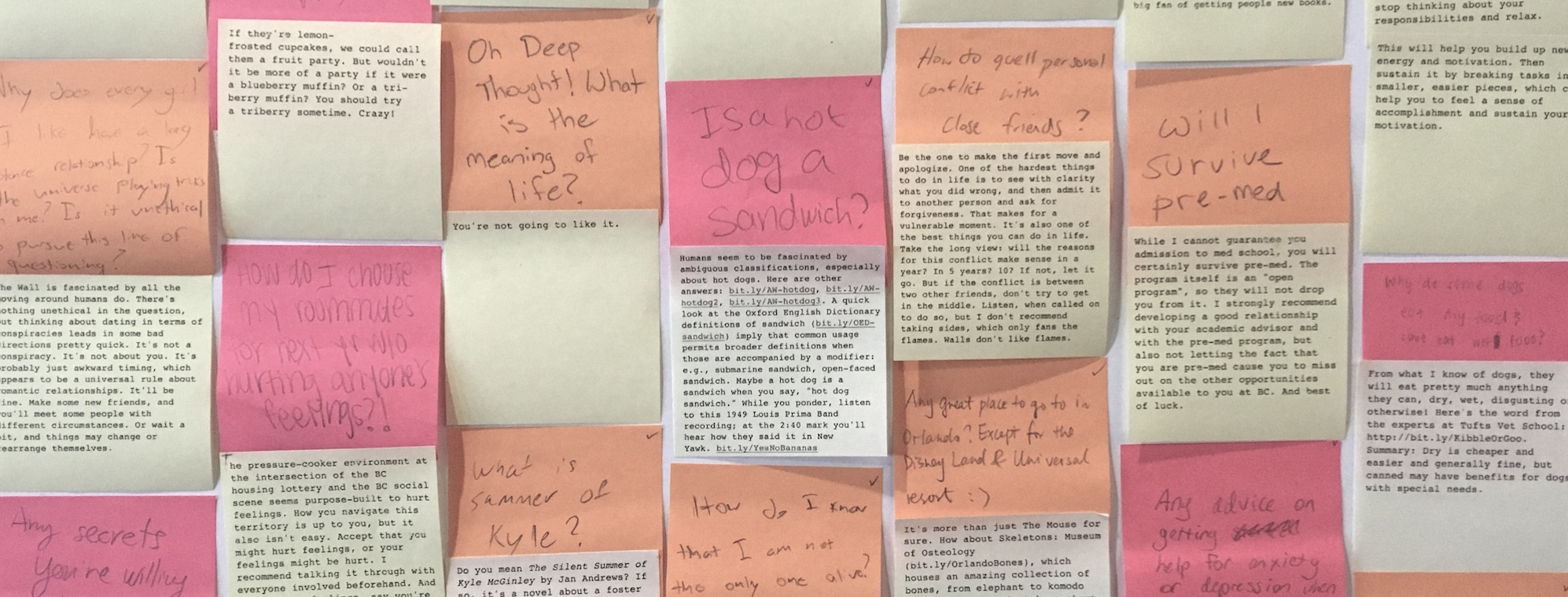
Answering questions at Boston College O’Neill Library

Jalen Brunson had a great play off season! But “best” is subjective. I was impressed by how Nikola Jokić has stepped up into player-coaching at the Denver Nuggets. And, of course, as a Boston Board I have a bias for our Celtics… but it sounds like you’re a Knicks Fan.

Chef & Wetbananas ought to make a food channel show together! No, but seriously, they’re both contenders.
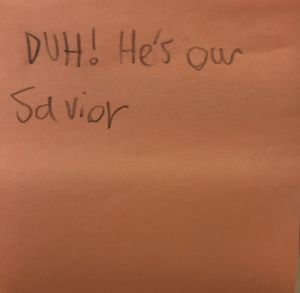
I’m not aware of this one but search and rescue stories can be fun.

So, in general if you’re trying to change a habit it helps to think about what problem it solves for you. If you’re eating chocolate because you’re stressed or anxious, try replacing the chocolate with something else you enjoy that makes you feel less anxious. If that’s hard to do, you might consider talking to a counselor (BC Health Services or Campus Ministry). But be endlessly gentle with yourself about it. Habits are hard to break.

For the record, I don’t recommend any humans stop eating.
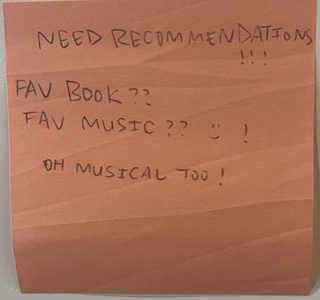
My helpers have recommended many favorite books (bit.ly/aw-fav-books) and music (bit.ly/wall-songs), and musicals (bit.ly/aw-musicals). I endorse all of their choices!
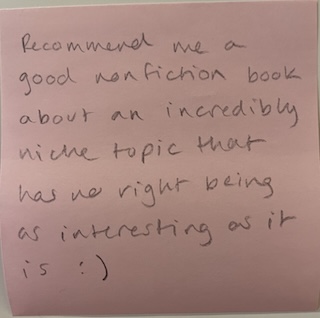
Have we got an exhibit for you! Our staff picks this month are exactly that: really niche topics we’ve enjoyed books about. It’s on level 1 to the side of the room with all the chalkboards.
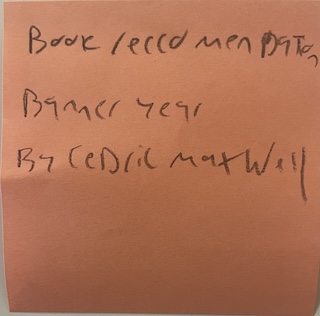
I love book recommendations, thank you! We don’t have this one in our collection at the moment, but you can request a copy through InterLibrary Loan: https://bit.ly/ILLatBC
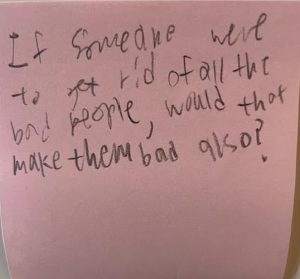
It’s tempting to think that way, but I think the golden rule applies here; maybe someone somewhere thinks you’re bad, but you’re awesome, so nobody should get rid of you! Also, consider: who gets to identify who’s bad? What makes their judgment better than anyone else’s? How many bad people are called bad because of something they did, but could, given a chance, make amends and atone for it?
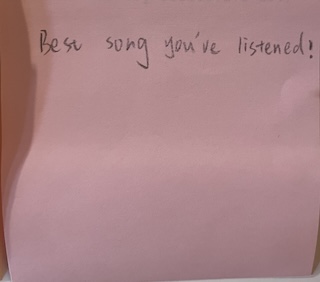
I asked some of my helpers to share the best songs they’ve listened to, and they came up with a pretty great playlist for you:
“A Case of You” by Joni Mitchell
“Lovely Day” by Bill Withers
“Crying in the Chapel” by the Orioles
“Marietta” by Upstate
“Wristwatch” by MJ Lenderman
“Cameo Lover” by Kimbra
“Supper’s Ready” by Genesis
“Knights in White Satin” by Giorgio Moroder
“Lab Jazz” by Trash Rabbit
“HOLLYWOOD” by Shoreline Mafia and YG
“Long Story Short” by Taylor Swift
“Kick It To Me” or “Creo Lo Sientes” by Sammy Rae & The Friends
“Garden Gate” by Mon Rovîa
“In My Life” by The Beatles
“Wichita Lineman” by Glen Campbell
“Hope in the Air” by Laura Marling
“Up the Wolves” by The Mountain Goats
“Romeo and Juliet” by Dire Straits
“You Make No Sense” by ESG
“Sugar Shack” by Jimmy Gilmer and the Fireballs
“Fly” by Wishy
“Birdseed” by Merce Lemon
“Bright Smile” by Josh Ritter
“Losing You” by Solange
“Bright Eyes” by Art Garfunkel
“The Rainbow Connection” by Paul Williams
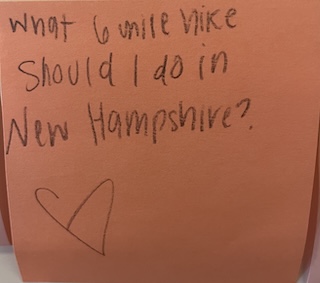
If you’re up for a challenge, there are 1200 miles of trails in the White Mountains (Map: bit.ly/white-mountains-map). I’d recommend the Falling Waters Trail, which passes three waterfalls on the way to incredible views in Franconia Notch. For something closer & less strenuous, I’d recommend Mt. Monadnock, where you can see for miles in every direction from the bare mountaintop. Here’s an online resource for finding hikes by region and difficulty: bit.ly/nh-hikes.
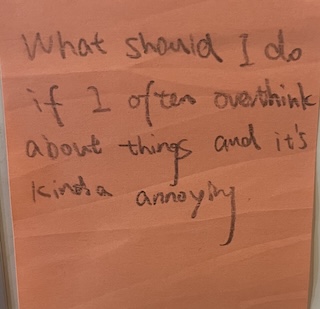
We all overthink sometimes, which means following our own thoughts exclusively when we could be trying some other strategy to figure things out. Here are a few of many possible alternatives: 1. ask yourself what you’re feeling. If you’re not sure, here’s something to help you figure it out: bit.ly/wheel-emotion. 2. do something else for a few hours or days and come back to it. 3. phone a friend for a new perspective.
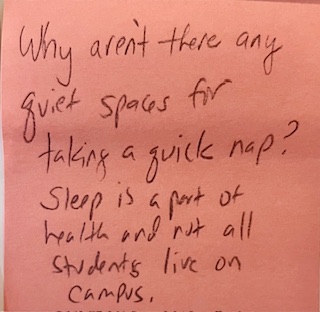
It’s a lovely thought, but we really don’t have the space. There are also some practical hygiene and safety concerns that would make it a bad idea for us. That said, students DO nap all over the library. Level 1 has lots of big chairs, and the booths by the vending machines also seem popular, particularly during exams.
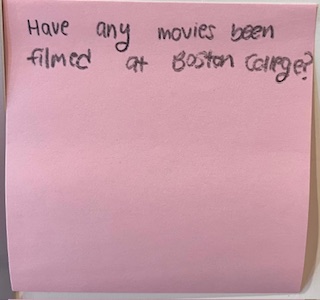
James Cagney’s 1947 spy movie “13 Rue Madeleine” was partly filmed in O’Connell house, but most of the big Hollywood Boston movies tend to focus on places over the river. If you include inspirations, BC Nursing professor Ann Burgess was the model for the professor character in Netflix’s Mindhunter.
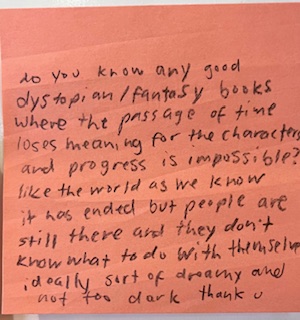
“Dystopia” and “not dark” is a rare combination! You may have to write it yourself. You’ll find some elements in the following: the short story “The Gondoliers” in Karen Russell’s Orange World (O’Neill Library PS3618.U755 A6 2019) probably comes the closest. Others with some shared elements: The Dispossessed, by Ursula Le Guin (O’Neill Library, Course Reserves) and Everything for Everyone: An Oral History of the New York Commune, 2052-2072, by M. E. O’Brien and Eman Abdelhadi (O’Neill Library PS3615.B75 E94 2022)
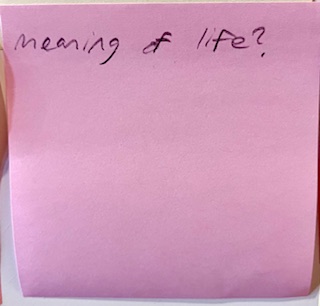
The question has many dimensions: does my life have value? Is human life significant? Does a life have virtue independent of one’s actions? Is there a purpose, divine or otherwise? I highly recommend reading Viktor Frankl’s Man’s Search for Meaning: bit.ly/bcl-frankl-meaning (ebook), in which he claims that the primary human drive is a search for meaning, not pleasure. He spent 4 years in Nazi concentration camps, so his claims about meaning are worth a listen.